IMF advises Iraq to reduce dependence on oil

The International Monetary Fund. Photo: AFP
Baghdad (IraqiNews.com) – The International Monetary Fund (IMF) recommended that Iraq reduce its dependence on oil and work to increase non-oil revenues to ensure the continuation of reforms and achieve economic stability.
The IMF’s recommendations followed discussions held by an Iraqi delegation headed by the Minister of Finance, Taif Sami, and experts from the IMF in the Jordanian capital, Amman.
A statement released by the IMF indicated that Iraq is expected to continue economic growth due to the expansion of public finances, but warned of a significant increase in oil price fluctuations in the medium term.
The statement revealed that reducing dependence on oil, ensuring financial sustainability, and working to protect social and investment spending are extremely important.
Iraq, the second-largest producer of crude oil in OPEC with an average daily production of 4.6 million barrels per day, depends on oil export revenues to provide 90 percent of the state’s budget.
Iraq’s foreign reserves increased to $112 billion by the end of 2021 from an average of $88 billion, according to an estimate from the IMF. This increase was attributed to improvements in oil prices in 2022 and the first few months of 2023.
Iraq must boost its non-oil exports and government income while lowering its economy’s vulnerability to fluctuations in oil prices, according to the IMF.
The IMF indicated that the growth of the non-oil sector in Iraq witnessed a strong recovery in 2023, as estimates indicate that Iraq’s non-oil GDP grew by six percent in 2023 after growth stopped in 2022.
Inflation in Iraq declined from 7.5 percent in January 2023 to four percent by the end of the same year.
The decline in inflation is due to the decline in food and energy prices at the international level, in addition to the impact of the revaluation of the Iraqi currency in February 2023.
